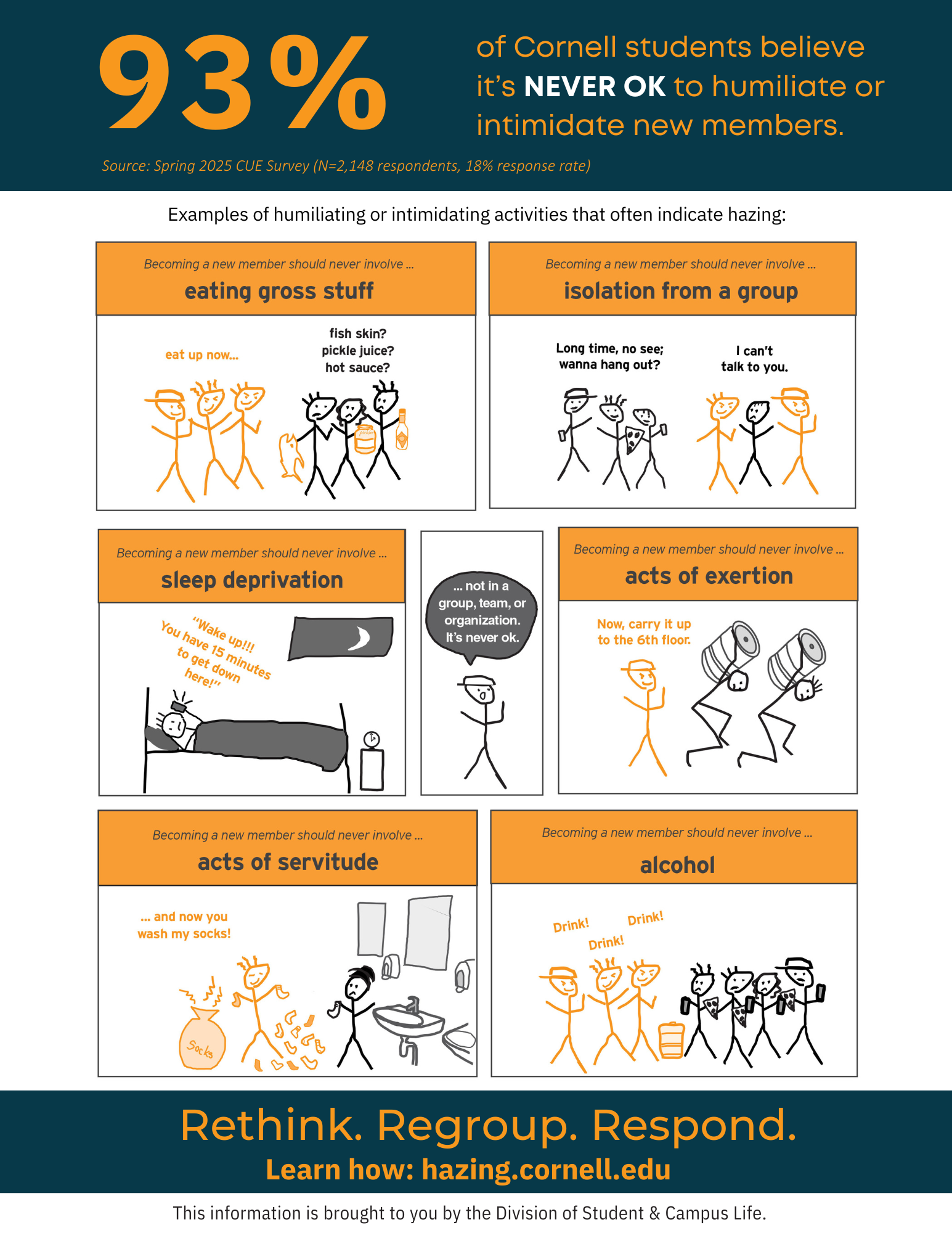Social Norms Campaign
Attitudes and beliefs vary when it comes to college hazing. However, nearly everyone can agree that joining a group, team, or organization should never compromise the safety of an individual or that of their community. In fact, 93% of Cornell students say "It's NEVER okay to humiliate or intimidate new group members."
Why share these statistics?
- Research shows college students tend to overestimate the extent to which other students are engaging in risky and potentially harmful behavior.
- Students also tend to exaggerate the extent to which their peers "support" or find such behavior socially acceptable. Such misperceptions influence an individual's behavior.
- Campaign strategies that include actual data to correct misperceptions and/or bolster positive norms are referred to as "social norms campaigns."
Where did the numbers come from?
The most recent data used in our social norms campaign came from the Spring 2025 CUE— "Cornell Undergraduate Experience" (N=2,148 respondents, 18% response rate). Previously, data came from prior CUE surveys, from Cornell's "Perceptions of Undergraduate Life & Student Experiences (PULSE)" Survey, and the "Membership Activities in Student Clubs, Organizations, and Teams (MASCOT)" Survey. Analysis of the data was provided by the Office of Institutional Research and Planning. All research was approved by the Institutional Review Board.
Social norms messages may be experienced by students—as well as the faculty and staff who work with them—as surprising, affirming or disturbing.
- Among those whose behavior reflects the norm, students may be encouraged to learn that others feel the same way too. And, they may be more likely to speak up if they see something happening that is hurting others.
- Among the subset of students who are acting problematic ways (humiliating or intimidating others in the group), social norms messages may raise the uncomfortable feeling of cognitive dissonance. In these cases, it is not unusual that students challenge the validity of the data in the message.
Will data change behavior at Cornell?
Signs are good! We are happy to report that the percentage of Cornell students who agree with a specific social norms message has risen more than 10% over the past decade.
- Original social norms statistic: When we first published the extent to which students believed it was “never okay to humiliate or intimidate new members” the number was only 82% (2013). Since then, it has steadily climbed... first to 87% (2015 & 2017), then to 90% (2018), to 91% (2021), and now to 93% (2025)!
- Two additional positive social norms were identified in the 2025 CUE — "Cornell Undergraduate Experience" Survey:
- 72% of Cornell students consider a group’s history of hazing when deciding whether or not to join.
- 84% of Cornell students believe hazing negatively impacts student health and well-being at Cornell.
We will continue to track growth of these data points over time, in hopes of growing the positive social norms.
Despite our progress, there is no "silver bullet" or single strategy that will entirely curtail hazing and its attendant harms. These social norms messages are part of a wider, more comprehensive approach to hazing prevention at Cornell. Faculty, staff, students, and members of the Ithaca community have guided the development of a comprehensive public health approach to addressing hazing at Cornell.
Who can I talk to about this campaign?
To discuss the social norms data, or hazing prevention-related resources, please contact the Skorton Center for Health Initiatives.

